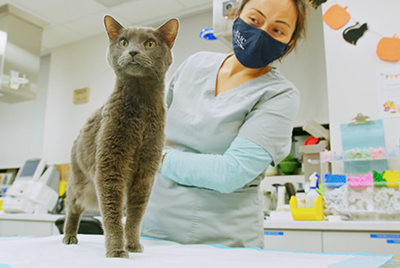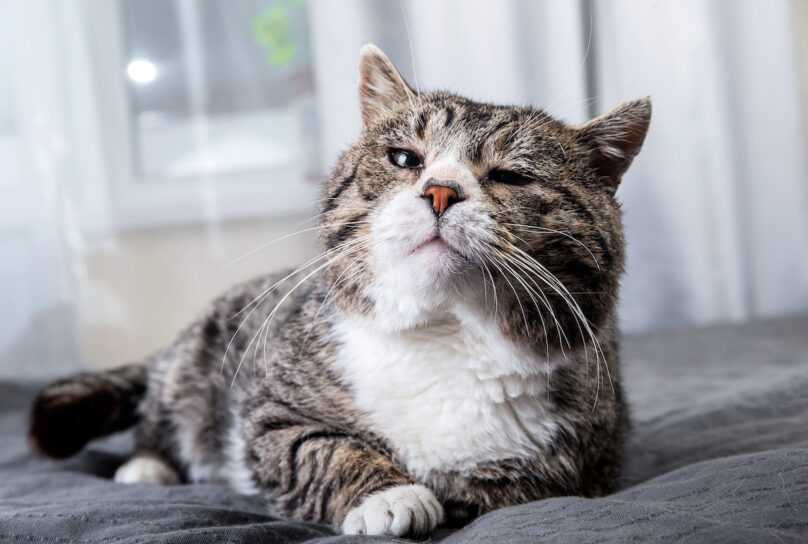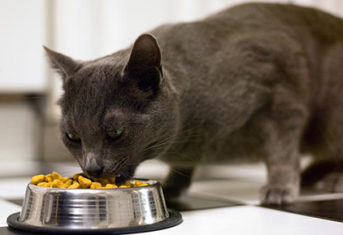Pioneering Research to Help Cats Live Longer and Healthier

Pioneering Research to Help Cats Live Longer and Healthier
June is Adopt a Shelter Cat month. Every year to celebrate, I devote my blogposts in the month of June to our furry, feline friends. June was chosen as Adopt a Shelter Cat month in part because kitten season is near its peak, and there are many kittens available for adoption in the summer and early fall. Wonderful adult cats are available for adoption from your local shelter year-round. Today’s blogpost will focus on new research that is helping cats live longer and better lives.
Feline Bladder Disease
Cats make wonderful pets, but one of their less endearing qualities is urinating outside the litter box. This behavior is often due to a somewhat mysterious disorder called feline lower urinary tract disease, or FLUTD. Cats with this disorder may stop using their litter box and urinate bloody urine in strange places like the bathtub. The underlying causes of this behavior might be bladder stones, an infection or a poorly understood disease called feline interstitial cystitis (FIC).
Fortunately, new research shows that these bladder conditions may not be as serious as they appear to the cat’s family. A recent study in the Journal of Feline Medicine and Surgery followed cats with FIC over a ten-year period, and the news from this study is good for both cats and cat owning families. Nearly half of the cats studied never had a second episode of bladder disease, and most cats were still alive at the end of the ten-year study. For those cats that had died by the end of the study, the cause of death was most often not related to their bladder condition. For tips on preventing bladder disease in your cat, read a previous blogpost about FLUTD and FIC.
Feline Osteoarthritis Risk Factors

Feline degenerative joint disease, or osteoarthritis, refers to the inflammation of one or more joints, leading pain, stiffness and a decreased quality of life in our feline friends. To better understand how to prevent this debilitating condition, researchers from the United Kingdom analyzed risk factors for the development of feline degenerative joint disease. Nearly 800 cats being monitored by the Bristol Cats Study were included in the publication. Cat owners completed a mobility questionnaire when their cat was 6 years old, and differences between cats with and without mobility issues were analyzed.
The findings of this study are unique because they identify factors cat owners can modify when the cat is young to alter their risk of developing osteoarthritis later in life. In this study, risk factor analysis demonstrated that obesity, outdoor access and a history of trauma may predispose cats to developing mobility changes associated with degenerative joint disease. Neutering before 6 months of age appeared to decrease that risk. According to the Association for the Prevention of Pet Obesity, in 2018, an estimated 60% of cats in the United States were overweight or obese. Getting your cat to lose weight and keeping her indoors will improve feline mobility and quality of life.
AMC Veterinarians Pioneer Techniques to Alleviate Kidney Obstructions
In cats, the conduit from the kidney to the bladder can become clogged, disrupting urine passage and causing kidney damage. In a previous publication, AMC veterinarians pioneered the use of subcutaneous ureteral bypass (SUB) to correct these blockages. Recently, the same Interventional Radiology team published a new feline study describing a method of unclogging the SUB if the artificial tubing becomes blocked with a blood clot. These groundbreaking techniques offer new solutions to alleviate kidney obstructions in our favorite felines.
This publication and the other two I have highlighted today are examples of why the final step in the research process is publishing a paper. These papers all share new knowledge gained during the scientific investigation to improve the lives of cats. Clinical research is one of the pillars of AMC’s non-profit mission, along with compassionate care and postgraduate education. In 2021, AMC staff published more than 40 peer-reviewed articles to generate new knowledge and benefit the lives of pet families everywhere.

































